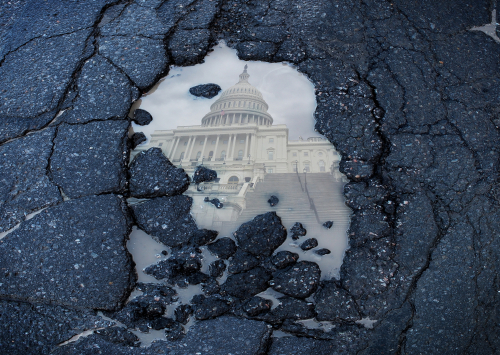
Failure to address inadequacies in U.S. infrastructure could stifle economic growth, cause the loss of $10 trillion in GDP, and lead to a decline of more than $23 trillion in business productivity over the next 20 years, a new report says.
The report, “Failure to Act: Economic Impacts of Status Quo Investment Across Infrastructure Systems,” from the American Society of Civil Engineers (ASCE), finds that the continued underinvestment in the country’s infrastructure will result in a cascade effect that will affect the economy, families, businesses and the country’s GDP.
But, in a webinar on Jan. 12, the ASCE and other infrastructure stakeholders said the incoming Biden administration has a far-reaching plan to address the country’s infrastructure. And there is bipartisan support for investment in infrastructure as not only a way to fix America’s crumbling roads and bridges, but also as a means to spur economic recovery from COVID-19 and create jobs.
“America’s infrastructure bill is overdue, and we have been ignoring it for years,” said Tom Smith, ASCE executive director. “There’s no better way to jumpstart the economy, while also lessening the financial burden on businesses and families, then by making a down payment on our infrastructure now – transit systems, bridges, water treatment plants, and the grid – to ensure these systems are sustainable, resilient and safe for communities across the nation.”
According to the study, U.S. companies across the spectrum would suffer if infrastructure needs are not addressed. U.S. manufacturers would be vulnerable because their production lines rely on energy, water and transportation systems in order to get goods from raw materials to the consumer. If inadequacies in infrastructure remain, U.S. exports will drop by $2.4 trillion, causing the national trade deficit to rise to $626 billion by 2039.
Lack of investment in infrastructure could also lead to 3 million jobs lost by 2039 – nearly half of which will be high wage and high production jobs in manufacturing, finance, insurance and real estate, professional services and healthcare.
Most of the economic declines, the report says, will happen between 2030 and 2039, when the effects of the underinvestment will escalate. The report estimates the country will see $18.8 trillion in gross output loss, $8.1 trillion in GDP declines, and a loss of $76 trillion in disposable household income.
ASCE estimates that the country will need to invest nearly $13 trillion across 11 infrastructure areas: highways, bridges, rail, transit, drinking water, stormwater, wastewater, electricity, airports, seaports and inland waterways. Planned investment into infrastructure currently totals more than $7.3 trillion, leaving a $5.6 trillion investment gap by 2039.
“Once again, the American Society of Civil Engineers has demonstrated, in stark detail, the high price Americans pay for failing infrastructure,” said U.S. Rep. Earl Blumenauer (D-OR). “The cost of inaction is too great for Congress to sit idly. I look forward to working with ASCE, President-elect Biden and Secretary Buttigieg to finally get the job done and rebuild and renew America.”
Blumenauer, a member of the House Ways and Means Committee, said he felt that Biden’s nomination of former South Bend Mayor Pete Buttigieg as Transportation Secretary meant good things for infrastructure investment, as Buttigieg has been an advocate of infrastructure investment for some time.
“President-elect Biden has a concrete plan for infrastructure and the House Democratic leadership is already involved with the Biden administration’s plans,” Blumenauer said.
ASCE says by increasing the investment in infrastructure by $281 billion a year, the U.S. can eliminate the infrastructure gap and save $10 trillion in GDP, 3 million jobs in 2039, and $3,300 in disposable income for families each year from 2020 to 2039.
“Infrastructure is a budget busting issue for America’s communities and families. So many local governments are struggling to balance their budgets due to the additional financial pressures of COVID-19. Meanwhile, Washington has failed to step up on infrastructure,” said Clarence Anthony, CEO and executive director of the National League of Cities. “America’s cities, towns and villages are ready to work with Congress, President-Elect Biden and his Administration to break out of this vicious cycle of emergency repairs and get our nation’s infrastructure fixed.”
Paying for the infrastructure investment probably won’t come from raising the gas tax, Blumenauer said. As the nation moves further toward electrification, gas taxes will become obsolete and new systems to pay for infrastructure investment have to be found. Congress was on a path to eliminate the gas tax, he said, but it would take some time to figure out how to replace it and to put in place a system that is more fair to everyone.